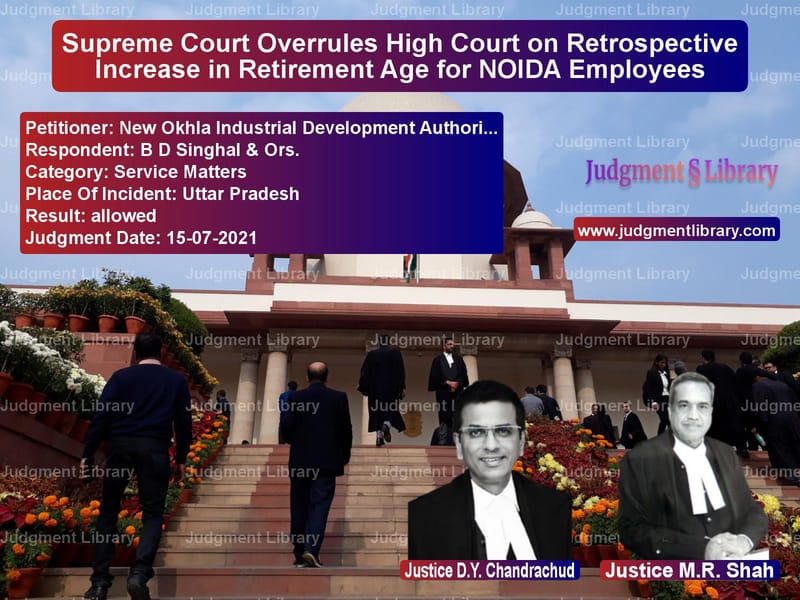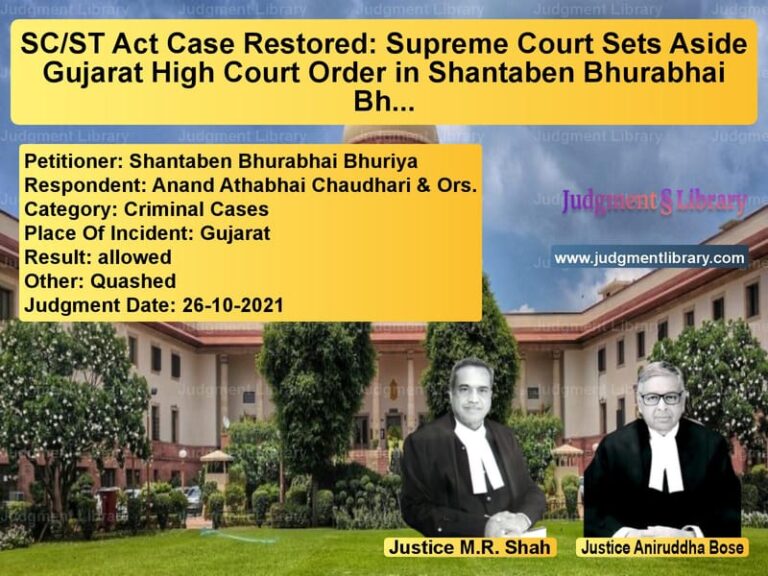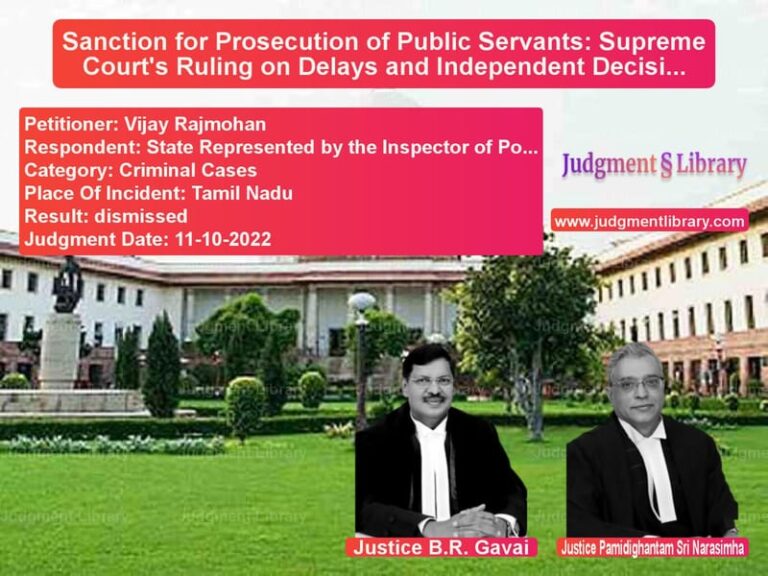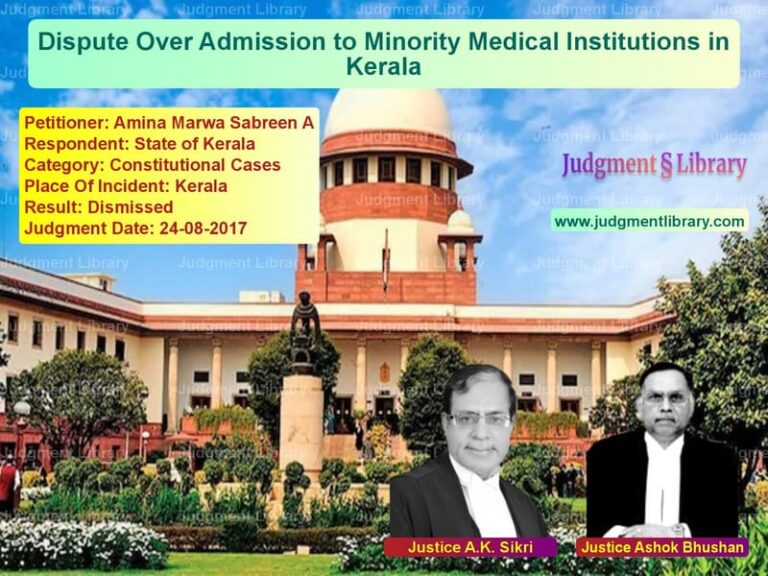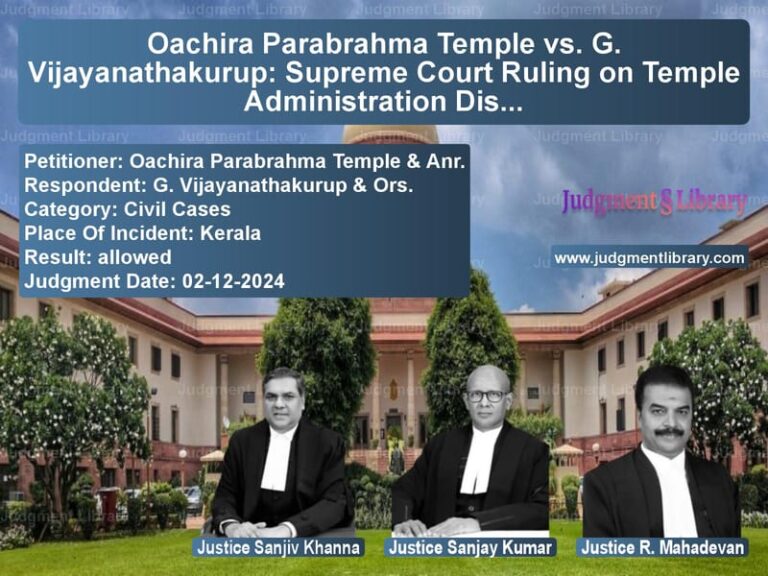Supreme Court Overrules High Court on Retrospective Increase in Retirement Age for NOIDA Employees
The case of New Okhla Industrial Development Authority (NOIDA) & Anr. v. B D Singhal & Ors. revolved around the retrospective application of an increased retirement age for NOIDA employees. The Supreme Court of India overturned the decision of the Allahabad High Court, which had ordered the retirement age of NOIDA employees to be increased from 58 to 60 years with retrospective effect. The Court ruled that such decisions fall under executive policy and the High Court overstepped its jurisdiction.
Background of the Case
The dispute began when the Government of Uttar Pradesh, on September 30, 2012, accepted NOIDA’s proposal to increase the retirement age of its employees from 58 to 60 years, but applied it prospectively. A Division Bench of the Allahabad High Court, exercising its power under Article 226 of the Constitution, directed that the change should have retrospective effect from June 29, 2002, leading to financial liabilities for the government and NOIDA.
Read also: https://judgmentlibrary.com/study-leave-for-government-doctors-supreme-court-ensures-fair-treatment/
NOIDA and the State of Uttar Pradesh challenged the High Court’s decision before the Supreme Court, arguing that it exceeded its judicial review power and encroached upon policy matters reserved for the executive.
Key Legal Issues
- Did the High Court exceed its jurisdiction by directing retrospective implementation of the increased retirement age?
- Can the courts interfere in policy decisions relating to service conditions of government employees?
- Did NOIDA employees have a vested right to claim the benefit of increased retirement age retrospectively?
Petitioners’ Arguments (NOIDA & State of Uttar Pradesh)
The petitioners made the following arguments:
- The High Court overstepped its power of judicial review by giving retrospective effect to a policy decision that was explicitly prospective.
- Service regulations, including retirement age, are subordinate legislation, and changes in such policies cannot be backdated unless explicitly stated.
- The government’s decision to apply the increase prospectively was based on financial and administrative considerations, which courts cannot interfere with.
- Employees who had already retired had no vested right to claim the increased retirement age retrospectively.
- Allowing such retrospective changes would open the floodgates for claims from retired employees in other public sector units.
Respondents’ Arguments (Retired NOIDA Employees)
The respondents contended:
- Since NOIDA had resolved to increase the retirement age in 2002 but delayed implementing it, employees who retired before 2012 were unfairly deprived of the benefit.
- The government had previously granted retrospective effect to similar policy changes in other public sector undertakings.
- Employees should not suffer because of bureaucratic delays in decision-making.
- The Allahabad High Court’s ruling was justified because the policy change was delayed due to government inaction.
Supreme Court’s Observations
The Supreme Court, in a judgment delivered by Justices D.Y. Chandrachud and M.R. Shah, ruled in favor of the appellants, stating:
“Whether the age of superannuation should be increased and, if so, the date from which this should be effected is a matter of policy into which the High Court ought not to have entered.”
The Court noted that NOIDA had submitted its proposal for increasing the retirement age in 2002, but the government rejected it in 2009. The decision to approve the increase in 2012 was a fresh policy determination and did not relate to the earlier proposal.
The judgment emphasized the following principles:
- Judicial Overreach: Courts should not interfere in executive decisions related to service conditions unless there is clear illegality or violation of fundamental rights.
- Policy Discretion: The government has the discretion to determine the date from which a policy change is implemented.
- Financial Considerations: Retrospective application of increased retirement age would impose an undue financial burden on NOIDA and the government.
- No Vested Right: Employees who retired before the change had no legal right to demand retrospective benefits.
The Court also rejected the respondents’ reliance on the doctrine of legitimate expectation, stating:
“The representation of NOIDA to the government for an increase in retirement age was merely a recommendation, which did not create any legal obligation.”
Key Takeaways from the Judgment
- High Court’s Overreach: The Supreme Court ruled that the High Court erred in imposing retrospective effect on a policy decision.
- Policy Discretion Upheld: Governments have the authority to decide from which date a policy change should be implemented.
- Financial Burden Considered: The Court recognized the financial implications of retrospective implementation and ruled against it.
- Impact on Future Cases: This ruling prevents arbitrary claims by retired employees based on delayed policy decisions.
Conclusion
The Supreme Court’s decision in New Okhla Industrial Development Authority (NOIDA) & Anr. v. B D Singhal & Ors. reaffirms the principle that courts must not interfere in policy decisions unless they violate constitutional provisions. By setting aside the High Court’s directive for retrospective implementation, the judgment upholds the government’s right to determine policy execution timelines.
The ruling serves as a precedent for future cases involving service conditions and policy changes, ensuring that judicial review does not encroach upon executive decisions.
Petitioner Name: New Okhla Industrial Development Authority (NOIDA) & Anr..Respondent Name: B D Singhal & Ors..Judgment By: Justice D.Y. Chandrachud, Justice M.R. Shah.Place Of Incident: Uttar Pradesh.Judgment Date: 15-07-2021.
Don’t miss out on the full details! Download the complete judgment in PDF format below and gain valuable insights instantly!
Download Judgment: new-okhla-industrial-vs-b-d-singhal-&-ors.-supreme-court-of-india-judgment-dated-15-07-2021.pdf
Directly Download Judgment: Directly download this Judgment
See all petitions in Pension and Gratuity
See all petitions in Employment Disputes
See all petitions in Promotion Cases
See all petitions in Judgment by Dhananjaya Y Chandrachud
See all petitions in Judgment by Mukeshkumar Rasikbhai Shah
See all petitions in allowed
See all petitions in supreme court of India judgments July 2021
See all petitions in 2021 judgments
See all posts in Service Matters Category
See all allowed petitions in Service Matters Category
See all Dismissed petitions in Service Matters Category
See all partially allowed petitions in Service Matters Category

